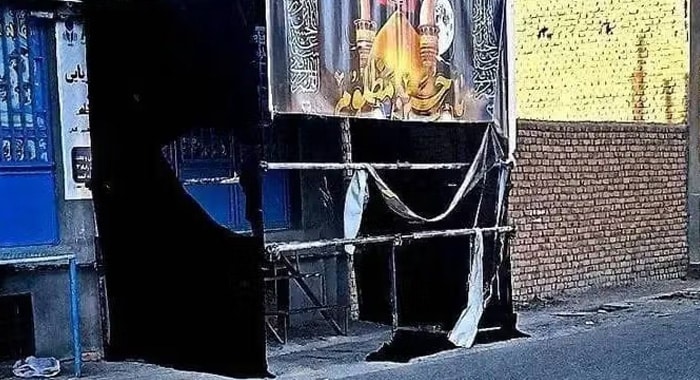The Taliban forcefully barred Shia Muslims in Herat’s Jebrael district from holding Muharram mourning rituals, using live fire and intimidation to disperse gatherings in a move widely condemned as a targeted act of religious repression. According to eyewitnesses, armed Taliban units stormed several neighbourhoods in Herat’s 13th district around 10 p.m. and shut down ongoing mourning ceremonies without prior warning. Video footage circulated on social media shows Taliban fighters firing weapons into the air and aggressively confronting mourners, dismantling all arrangements prepared for the commemorations.
Residents say the gatherings had been peacefully underway in areas that were previously agreed upon following consultations between Shia scholars and Taliban officials. However, a sudden directive from Kabul has banned Muharram rituals except in locations directly adjacent to mosques, effectively outlawing traditional public ceremonies that have been observed for generations.
“They gave verbal assurances before Muharram began, and now they’re using guns to break those same promises,” said a local community elder. “This is not enforcement of order it’s the erasure of identity.”
In response, Mohammad Ismail Ahmadi, head of the Shia Ulema Council of Herat, appealed for restraint during a memorial ceremony for the late Shia scholar Mohammad Jafar Tawakoli, while confirming that talks were underway with the provincial governor and Taliban authorities. “The community is wounded. We followed every guideline, yet we were attacked,” Ahmadi stated. “We ask our people to remain peaceful, but silence cannot be mistaken for consent.”
Azizurrahman Muhajir, the Taliban’s head of the Directorate for the Propagation of Virtue and Prevention of Vice in Herat, confirmed the enforcement of the new restrictions during a meeting with Shia clerics, stating that mourning rituals must take place only in officially authorised locations. His remarks, carried by the Taliban-run Bakhtar News Agency, were met with outrage from mourners and rights activists alike.
This is the second consecutive year that violence has broken out in Jebrael during Muharram due to Taliban-imposed limitations. Rights groups and observers warn that such incidents are part of a broader campaign to suppress Shia religious expression under the guise of administrative regulation.
“The Taliban’s actions are not about order or public safety they are about controlling and silencing a religious minority,” said a Herat-based civil rights activist. “This is state-sanctioned discrimination, carried out with guns.”
The Jebrael area, home to a large and historically devout Shia population, has increasingly become a focal point of Taliban crackdowns. Local leaders fear more confrontations could erupt in the coming days as Ashura approaches, with community members bracing for further attempts by the regime to obstruct mourning ceremonies.
Calls are mounting for the United Nations and international human rights bodies to urgently intervene and demand that the Taliban honour the religious freedoms of all Afghans—especially during a sacred month observed across the Islamic world.
As of Tuesday, the atmosphere in Herat remains tense, with Taliban patrols reportedly still monitoring Shia neighbourhoods and mourners expressing both grief and defiance in the face of mounting restrictions.





